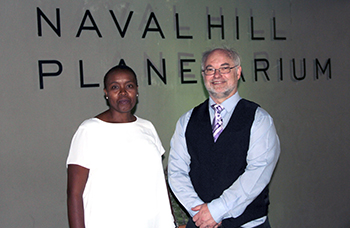Latest News Archive
Please select Category, Year, and then Month to display items
20 December 2021
|
Story Igno van Niekerk
|
Photo Igno van Niekerk
![]() Dr Samantha Potgieter, Senior Lecturer in the Department of Internal Medicine and Dr Nicholas Pearce, Senior Lecturer in the Department of Surgery comment on their team members’ commitment and determination during the pandemic.
Dr Samantha Potgieter, Senior Lecturer in the Department of Internal Medicine and Dr Nicholas Pearce, Senior Lecturer in the Department of Surgery comment on their team members’ commitment and determination during the pandemic.
On the forefront of the battle against the COVID-19 pandemic, two UFS doctors are leading a team of inspired healthcare workers in a superhuman effort to make a positive difference.
With the pandemic in its second year and the recurring challenges of new waves and strains consistently in the news, one would expect the doctors to be tired. However, quite the opposite is true. Upon entering the office where Dr Samantha Potgieter, Senior Lecturer in the Department of Internal Medicine and Dr Nicholas Pearce, Senior Lecturer in the Department of Surgery are in a meeting with colleagues, the debate is vibrant; an energetic sense of mission.
Miraculously succeeded
My brief is to collect stories and experiences they’ve had over the past 18 months at the Tumelo ward for general and high-care patients, where the team has miraculously succeeded in not running out of oxygen or ventilators, despite handling high volumes of patients from the Free State and Northern Cape. “We saw those pictures of piled-up bodies in Italy. We were committed to avoiding that at all costs. And we did.”
Success stories? First mentioned are their team members’ commitment and determination. The team had to stand in when families could not support dying patients. “They did not die alone. Our team was there.”
“Really sad and frustrating are the deaths that could have been prevented. Unvaccinated patients. They arrive ill, wanting to know if they can get it. Too late...” – Dr Nicholas Pearce
Then came hope
Sad stories? The past year has had its share of sad stories. “Someone comes in during the morning, needs oxygen, in the afternoon they are in ICU, then ventilator – and then they die. We’ve never faced anything like this before.”
Then came hope. Vaccines. Dr Pearce is in charge of the vaccination site at Universitas Hospital. “Really sad and frustrating are the deaths that could have been prevented. Unvaccinated patients. They arrive ill, wanting to know if they can get it. Too late ...” He opens his cell phone – shares the stats. “We can handle 2 000 vaccinations a day. At the moment about 250 comes in.” He shakes his head.
“We can beat this virus, but we need to stand together ...”
An out-of-this-world experience
2015-12-14

Film premiere hosts Professor Matie Hoffman, manager of the Naval Hill Planetarium and the planetarium’s operations manager, Tina Mangope. |
The Naval Hill Planetarium in Bloemfontein premiered two new short astronomy films on 4 December 2015, with marvellous cosmic visuals explaining how the earth and all the planetary formations in our galaxy and the universe were created.
The two films, aptly titled ‘Cosmic Collisions’ and ‘Journey to the Stars’, were both made to enhance people’s knowledge about the universe and the vast dynamics within it. They were donated to the Bloemfontein-based planetarium by the American Museum of Natural History in collaboration with several other US space science intuitions, including the National Aeronautics and Space Administration (NASA).
“These two fantastic state-of-the-art films are scientifically accurate and very expansive,” said Professor Matie Hoffman of the Department of Physics and Astronomy at the University of the Free State. Hoffman is also the planetarium’s manager.
Nestled in the bushy landscape of historic Naval Hill - also home to the iconic statue of Nelson Mandela and the Franklin Game Reserve - the Naval Hill Planetarium was opened in 2013. It is the first digital planetarium in Sub-Saharan Africa, and is situated at the old Lamont-Hussey Observatory Building, which was closed in 1972.